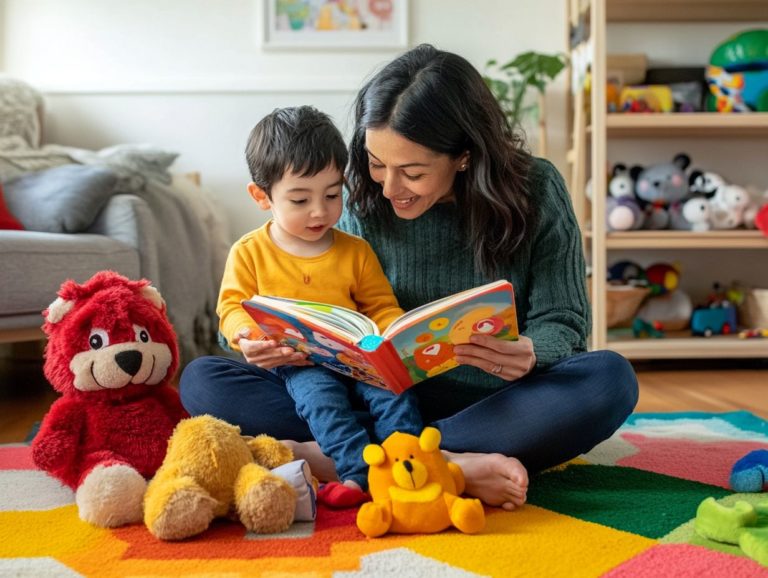5 Strategies for Effective Parent-Child Talks
Effective parent-child communication serves as the cornerstone of a strong parent-child relationship.
This article delves into five essential communication strategies that can fundamentally enhance the way you connect with your child. By creating a safe environment, actively listening, and setting clear expectations and boundaries, these techniques empower you to foster open dialogue and mutual understanding.
It also addresses common barriers to communication, such as misunderstandings and distractions, and provides valuable tips for navigating those challenging conversations. You’ll discover practical ways to encourage your child to express their thoughts and feelings, ensuring a healthy and positive exchange that strengthens your bond.
Contents
- Key Takeaways:
- 1. Create a Safe and Open Environment
- 2. Listen and Validate Your Child’s Feelings
- 3. Use Positive Reinforcement
- 4. Set Clear Expectations and Boundaries
- 5. Be a Role Model for Effective Communication
- How Can Effective Communication Strengthen the Parent-Child Relationship?
- What Are the Common Barriers to Effective Parent-Child Talks?
- How Can Parents Improve Their Listening Skills?
- What Are Some Effective Communication Strategies for Difficult Conversations?
- How Can Parents Encourage Their Child to Open Up and Share Their Thoughts, Emotions, and Feelings?
- What Are Some Tips for Maintaining a Positive and Healthy Parent-Child Interaction?
- Frequently Asked Questions
- What are the 5 Strategies for Effective Parent-Child Communication?
- How can active listening improve parent-child talks?
- Why is setting boundaries important in parent-child talks?
- How Can Positive Reinforcement Be Used in Parent-Child Interaction?
- Why is empathy important in parent-child talks?
- What should parents avoid when having talks with their child?
Key Takeaways:

- Creating a safe and open environment is crucial for effective parent-child communication. This involves actively listening, validating your child’s feelings, and using positive reinforcement.
- Setting clear expectations and boundaries can help establish a healthy dynamic in parent-child communication. It is important to be consistent and understanding in enforcing these boundaries and to follow your child s lead where appropriate.
- Being a role model for effective communication can greatly strengthen the parent-child relationship. This includes actively listening, using respectful language, and being open to difficult conversations.
1. Create a Safe and Open Environment
Creating a safe and open environment for communication with your child is essential for building strong relationships and promoting effective dialogue. When you actively listen and respond to their interests, you lay the groundwork for trust and understanding. This approach contributes to their emotional and social development.
This means using positive language and nurturing a playful environment where your child feels comfortable expressing their thoughts and feelings, which ultimately supports their emotional and social growth.
Incorporating playful activities such as games, storytelling, and art can greatly enhance this interaction. For example, drawing together or playing charades can spark conversations about everyday experiences and emotions, making discussions feel less intimidating. This fun approach makes communication really enjoyable and helps in expanding your child’s vocabulary and problem-solving skills.
Your role as a parent is vital in this process. Your involvement not only strengthens the bond but also encourages your child to articulate their thoughts clearly. By establishing clear expectations for communication and consistently using reassuring, upbeat language, you can model effective communication skills. This enables your child to express themselves more confidently and openly, which is crucial for their overall development.
This foundational approach to dialogue nurtures understanding and cultivates an atmosphere of respect and empathy, where every voice especially your child s is valued. Engaging in quality time and fun activities together further enhances your relationship.
2. Listen and Validate Your Child’s Feelings
Listening to and validating your child’s feelings is crucial for developing their empathy and enhancing their emotional intelligence. It ensures they genuinely feel heard and understood, promoting better parent-child communication.
By actively engaging in conversations and truly tuning in to what your child is expressing, you can cultivate a supportive environment where emotions are both acknowledged and explored. For example, when your child is upset about losing a game, responding with something like, “I can see you’re feeling really disappointed right now,” helps them recognize their emotions and feel supported. This also provides an opportunity to teach them about empathy and emotional regulation.
Employing open-ended questions, such as “What do you think might help you feel better?” encourages deeper reflection and fosters communication. These interactions not only validate your child’s feelings but also model empathetic behavior, paving the way for them to understand and express empathy in their interactions with others. This is a critical part of their emotional and social development.
3. Use Positive Reinforcement
Using positive reinforcement is a powerful strategy in your parent-child communication arsenal, as it encourages the behaviors you want to see while simultaneously strengthening your relationship. This method is widely supported in parenting guidelines and educational strategies.
This approach can manifest in various forms, such as offering verbal praise, where you acknowledge and commend your child s efforts or achievements, giving their confidence a delightful boost. You can also create opportunities for your child to demonstrate and develop their skills through play and educational activities.
Engaging in enjoyable activities together, like playing games or diving into shared hobbies, not only rewards good behavior but also creates treasured memories. Such quality time is invaluable in building strong parent-child relationships.
Such reinforcement cultivates an environment rich in open dialogue and trust, making your child feel valued and understood. This sense of validation enhances their motivation to excel and plays a significant role in building their self-esteem, enabling them to tackle challenges with a positive outlook. Additionally, positive language and fun activities further contribute to their overall development.
4. Set Clear Expectations and Boundaries

Setting clear expectations and boundaries is essential for effective communication between you and your child. This structure not only helps your child understand their responsibilities but also fosters a sense of security in their daily lives. Consistency in enforcing these guidelines is key in parenting.
When expectations are made crystal clear, your child gains the ability to assess situations, make informed decisions, and truly grasp the consequences of their choices. As they grow, it’s crucial for you to remain flexible, adapting those boundaries to align with their evolving needs. This also helps in developing their problem-solving skills and critical thinking.
By engaging in regular discussions about these expectations, you encourage your child to express their thoughts, which in turn cultivates their critical thinking skills and enhances their communication strategies. You play a pivotal role in this journey, modeling adaptable strategies that enable your child to navigate the various challenges they may face with confidence and resilience.
5. Be a Role Model for Effective Communication
Being a role model for effective communication is essential in guiding your child to develop robust conversational skills and empathy through observation and imitation. This modeling behavior is a cornerstone of effective parenting.
By actively engaging in conversations and demonstrating attentive listening, you can create an environment where your child feels valued and understood. For instance, when discussing daily events, incorporating varied vocabulary can significantly enhance your child’s language skills while also underscoring the importance of expression. This technique is often recommended by teachers and education experts to foster a love of language and communication.
Modeling behaviors such as giving constructive feedback, asking open-ended questions, and acknowledging feelings allows your child to grasp the nuances of social interactions. This practice not only enriches their understanding of communication but also fosters empathy, enabling them to appreciate diverse perspectives and emotions in others. Furthermore, it helps in expanding their vocabulary and encouraging the use of various words in daily conversations.
Ultimately, these meaningful interactions lay a strong foundation for healthy interpersonal relationships as they grow. Spending quality time and engaging in activities that promote communication are essential for this development.
How Can Effective Communication Strengthen the Parent-Child Relationship?
Effective communication is the cornerstone of a robust parent-child relationship. It fosters trust, understanding, and a profound sense of security that leads to deeper emotional connections. Engaging in active listening and using positive language are key strategies to achieve this.
By engaging in open dialogues with your children, you create invaluable opportunities for shared experiences, which strengthens your familial bond. Implementing strategies such as listening carefully, scheduling regular family discussions, or incorporating storytelling can significantly nurture these essential conversations. These methods not only improve communication but also enhance language skills and empathy development.
For instance, asking thought-provoking questions during mealtime encourages your children to express their thoughts and feelings. This allows you to gain a better understanding of their perspectives. Such interactions enhance the emotional intelligence of both you and your child and play a pivotal role in their social development, equipping them with essential skills to navigate relationships successfully. Creating opportunities for meaningful interactions is integral to effective parenting.
What Are the Common Barriers to Effective Parent-Child Talks?
Common barriers to effective parent-child conversations arise from misunderstandings, distractions, and emotional responses that inhibit open communication. Hectic schedules make it challenging to find quality time for meaningful interactions.
To cultivate healthier dialogue, recognize that the demands of modern life, including hectic schedules and the ever-present allure of digital devices, considerably fragment your focus. Emotional triggers, often rooted in past experiences or current stressors, can incite reactions that stifle meaningful exchanges. Mindful listening and reducing unnecessary questioning can help maintain constructive conversations.
By practicing mindful listening being fully present and minimizing distractions like smartphones you can create a more inviting atmosphere for discussion. Acknowledging your emotional responses allows you to approach conversations with patience and empathy, paving the way for deeper connections with your children. This approach is recommended by parenting and education experts for its effectiveness in building robust relationships.
How Can Parents Improve Their Listening Skills?

You can significantly enhance your listening skills by embracing active listening techniques that show genuine interest in your child’s thoughts and feelings. Such techniques are pivotal in fostering robust parent-child communication.
Incorporating strategies such as summarizing what your child has expressed and asking open-ended questions creates an environment in which they truly feel heard. For example, when addressing your child’s concerns, paraphrasing their feelings validates their experiences and demonstrates that you value their perspective. This also helps expand their vocabulary and develop their empathy.
Paying attention to non-verbal cues like maintaining eye contact and observing body language enhances the communication process. These strategies encourage your child to share more openly and cultivate stronger trust and connection in your relationship, leading to more meaningful interactions.
What Are Some Effective Communication Strategies for Difficult Conversations?
Navigating difficult conversations with children requires you to employ effective communication strategies such as using positive language and maintaining a calm demeanor to help you understand them better.
Incorporating methods like role-play and storytelling can significantly elevate your discussions. Role-play allows children to explore their emotions and reactions within a safe environment. Storytelling simplifies complex issues, making them more digestible for young minds, helping them expand their vocabulary and understanding.
Modeling problem-solving skills during these interactions shows children how to approach challenges thoughtfully and calmly. This helps them learn essential tools to navigate their difficulties in the future while fostering resilience and critical thinking. Modeling behavior significantly helps in teaching effective communication.
Encouraging a child to open up requires you to cultivate an inviting atmosphere that prioritizes communication and emotional connection.
You can achieve this through regular check-ins. These not only show your child that their feelings are important but also create structured opportunities for sharing. Use specific prompts like open-ended questions about their day or feelings to inspire deeper reflection and expression. By actively listening and validating their emotions without judgment, you establish a safe space where your child feels secure expressing themselves. Responding with interest invites them to share even more.
This nurturing approach builds trust, reinforcing the message that their thoughts and feelings truly matter. It paves the way for more meaningful conversations and is a valuable strategy for building relationships and improving conversational skills.
What Are Some Tips for Maintaining a Positive and Healthy Parent-Child Interaction?
Maintaining positive and healthy communication requires a commitment to thoughtful engagement and creating quality time for meaningful interactions. This effort nurtures an environment where your child feels valued and heard.
Scheduling regular family activities can be a powerful strategy, allowing both of you to bond while creating lasting memories. Consistently using positive language encourages openness, making your child feel comfortable expressing their thoughts and feelings. It’s equally important to be fully present during conversations, demonstrating active listening and genuine understanding.
As your child grows, these dynamics may need to shift. Remaining flexible and adapting your communication style to suit their evolving needs is essential for maintaining a strong connection. Parental involvement plays a crucial role in adapting parenting techniques.
Frequently Asked Questions

What are the 5 Strategies for Effective Parent-Child Communication?
The 5 strategies for effective parent-child talks are active listening, open communication, setting boundaries, using positive reinforcement, and showing empathy.
How can active listening improve parent-child talks?
Active listening means giving your full attention and understanding what the child is saying. This encourages open communication and builds trust and understanding between parent and child, enhancing their overall communication skills.
Why is setting boundaries important in parent-child talks?
Setting boundaries helps establish clear expectations and rules for conversations. This can prevent misunderstandings and conflicts, promoting a healthy and respectful dialogue.
How Can Positive Reinforcement Be Used in Parent-Child Interaction?
Effective communication between parents and children is essential. Here are some key aspects to consider.
Positive reinforcement, which means encouraging good behavior by giving praise or rewards, involves recognizing and praising the child for their efforts and accomplishments. This can help boost their self-esteem. It strengthens the bond between parent and child, making communication a delightful experience!
Why is empathy important in parent-child talks?
Empathy helps build a stronger connection and trust between parent and child. Understanding and acknowledging the child’s emotions and perspective lead to more effective communication and aids in empathy development in children.
What should parents avoid when having talks with their child?
Parents should avoid being judgmental, dismissive, or using harsh words or criticism during talks. This can create a hostile environment and hinder effective communication. Instead, follow the child’s lead and use positive reinforcement.






